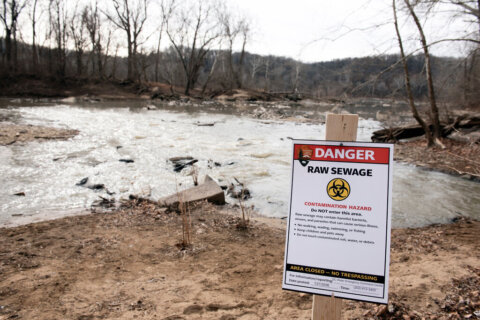This article was republished with permission from WTOP’s news partners at Maryland Matters. Sign up for Maryland Matters’ free email subscription today.
WASHINGTON — The decade-long endeavor to move the Federal Bureau of Investigation out of its crumbling headquarters in downtown Washington, D.C., and into a new facility outside the city could face roadblocks next year.
President-elect Donald Trump and some of his top allies in Congress have rebuked the federal agency that undertook the search for a new suburban location, ultimately deciding on Greenbelt, Maryland, over two other options.
Once Trump is back in the Oval Office and the GOP controls both chambers of Congress, the funding stream for the General Services Administration to build the new facility could end.
Republican lawmakers could also require the GSA to restart the search process, change the criteria the federal agency used to select the Greenbelt location, or simply tell the agency it must construct the new headquarters in a different location. Other options floated by GOP lawmakers include Alabama and somewhere inside the District of Columbia. Or they could require GSA to build the new FBI headquarters in either Springfield, Virginia, or Landover, Maryland — the other two locations considered for the new building.
Maryland Sen. Chris Van Hollen, the top Democrat on the spending panel that controls GSA’s budget, told States Newsroom he believes the issue is settled, in part, because some funding has already been allocated for the project.
“We’re going to work very hard to make sure we keep the program on track,” Van Hollen said. “I think there’s a consensus that the FBI’s current headquarters does not meet the security requirements, does not meet the other requirements. So, you know, from our perspective, a decision has been made and we will work hard to make sure it’s executed, implemented.”
Construction funding
Congress approved $200 million for the headquarters project this spring as part of a much larger government spending package.
Beyond that, funding is less certain.
The Senate Appropriations Committee, controlled by Democrats, has proposed $375 million for construction in this year’s GSA spending bill. That measure, which includes numerous other funding proposals, received bipartisan support during a committee vote. In January, control of the Senate will flip to the GOP.
The House version of the bill, drafted by Republicans, doesn’t include any funding for a new FBI headquarters and would require the GSA to send Congress “a detailed plan and timeline to support the District of Columbia based personnel by keeping the current FBI headquarters operational or identifying another Federally owned location in the District of Columbia that can serve as the FBI headquarters building.”
The two chambers will likely negotiate a final, bicameral version of the bill during the first few months of next year, once the GOP holds unified control of Congress and the White House.
Trump hotel
Virginia Democratic Sen. Tim Kaine said during an interview he hadn’t really thought about whether his state could become the new site for the FBI headquarters.
“If you just go by history, Trump didn’t want to put any money into a new FBI headquarters,” Kaine said. “He didn’t want that block that the FBI is on to be cleared and opened for a hotel that might compete with his own hotel. So four years of the Trump administration was him basically doing everything he could to stop a move and to stop funds being used for the move.
“Now he may not have the same financial interest that he had back then so I bet it’s hard to say.”
Trump owned a hotel in the old Post Office building along Pennsylvania Avenue during his first term in office, but it was later sold and is now a Waldorf Astoria. The building is about one block away from the current FBI headquarters.
Maryland Rep. Steny Hoyer, the top Democrat on the House panel that funds the GSA, told States Newsroom there’s “no doubt” the Greenbelt location “is the best site, both in terms of security and in terms of finances.”
“I’m going to continue to push that position,” Hoyer said. “We need to get this done for the FBI, for the American people. The building is literally falling down. And the fact that we have delayed this … is testament that we’ve escalated cost, decreased security for the federal employees at FBI, and we ought to move on. And hopefully we will.”
The Maryland and Virginia governors’ offices declined to comment for this article. A GSA representative, speaking on background, said the agency has submitted a report to Congress that was required by the spending package lawmakers approved in March 2022.
GSA, the person said, is trying to secure “resolutions” from congressional committees before it obligates funds to buy the site or begin design and construction activities. They said this is consistent with other large-scale development projects that require congressional approval. It was not clear what those resolutions would say.
Evaluation of selection process continues
The GSA has been under review by its inspector general for how it undertook the site selection process for more than a year, one factor that could potentially complicate things during unified Republican control of Washington.
GSA acting Inspector General Robert Erickson launched an evaluation into the agency’s process in November 2023, a few weeks after GSA announced its decision to pick the Greenbelt, Maryland, location.
That evaluation is ongoing, and the inspector general continues “to work thoroughly and expeditiously on the project,” according to a spokesperson.
Virginia Democratic Sen. Mark Warner told States Newsroom in a brief interview he’s waiting to see the inspector general’s evaluation before deciding on a path forward.
“I know people thought that it might come out in the spring. It didn’t,” Warner said. “The reports we’ve got is that they’re still doing the investigating, and let’s see what that says first.”
Hoyer said he doesn’t expect the results of that evaluation will affect moving the FBI headquarters to Greenbelt.
“I think everything was done absolutely as it should have been,” Hoyer said. “An argument was made by both sides in public on the merits of their sites.”
Debate over process
FBI Director Christopher Wray also questioned the decision last year, writing in a letter to employees that he and others held “concerns about the fairness and transparency in the process,” though he wrote those “concerns are not with the decision itself but with the process.”
Trump has announced he will name Kash Patel as head of the FBI, though Wray would have to be fired or quit first. Trump has not yet named someone to lead the GSA.
The Greenbelt decision brought about some bipartisanship in Congress, with House Oversight & Accountability Committee Chair James Comer, a Kentucky Republican, and Rep. Gerry Connolly, a Virginia Democrat, urging GSA to conduct a full investigation into the site selection process.
The two said the most disturbing aspect to them was that then-GSA Commissioner of the Public Building Service Nina Albert “overturned the unanimous site decision of an expert panel of civil servants representing GSA and its agency client, the FBI.”
Albert left that role on Oct. 13, 2023, about a month before the final decision was announced. General Services Administrator Robin Carnahan had also said two years earlier Albert didn’t have a conflict of interest.
“Congress created GSA in 1949 to increase the efficiency and economy of federal government operations — not least the procurement and use of property,” Comer and Connolly wrote in their letter. “To fulfill that mission, GSA must be fair and transparent in its operations. Its real estate dealings should consider only what is best for taxpayers and the Nation. It must set aside political or parochial interests.”
Comer and Connolly added they were “deeply concerned that GSA’s choice of a new FBI headquarters site departed from those principles — and in doing so, failed to put taxpayers and the public interest first.”







